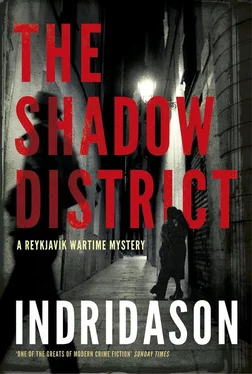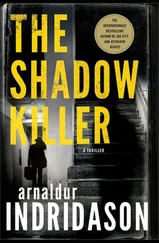‘Really?’ said Thorson. ‘She had a daughter?’
‘An only child, I believe,’ said the engineer. ‘Wasn’t there something a bit fishy about that theatre case? Geirlaug was talking about it once.’
‘Fishy? How do you mean?’
‘Oh, I forget what it was.’
‘Something linked to the dressmaker?’
‘Yes, I expect that was it.’
‘Had this Geirlaug been talking to her then?’ asked Thorson.
‘Yes, or to her daughter, I think.’
A couple of days later, unable to shake off his curiosity, Thorson rang the engineer’s friend Geirlaug and asked her for the daughter’s name. She was happy to oblige, informing him that the dressmaker’s daughter was called Petra. When it came to actually contacting her, though, Thorson dithered a little before finally going ahead. He needn’t have worried. Petra was friendly and invited him round. She was the one who provided him with the missing piece: Rósamunda had refused to take any deliveries to the Reykjavík home of the very member of parliament who, together with his son Hólmbert, had been instrumental in implicating Jónatan and persuading Flóvent to drop the investigation.
Rósamunda’s case had haunted Thorson ever since that rainy day when he said farewell to Flóvent on the Reykjavík docks, and all through the fighting that followed and the subsequent years of peace. After his demobilisation, Thorson had headed home to Canada to finish his degree. He had realised his dream of qualifying as a structural engineer, and when his father died after a brief spell in hospital, Thorson decided he had nothing to lose. He sent a speculative letter to Iceland, which resulted in the offer of an engineering contract. He had only intended to spend a few years there, while he tried to achieve some sort of equilibrium after the turmoil of his wartime service. His mother had noticed the change in him since he came home from the fighting in Europe, noticed a tendency to depression, anxiety and tension that was quite unlike her son. Thorson never spoke much about his part in the war, merely commenting that it was nothing to be proud of. Despite being decorated by the Canadian Army for his bravery, he insisted that he was no hero; the real heroes were the comrades he had lost and still missed.
‘What are you going to do in Iceland?’ asked his mother. If anything, she had tried to discourage him from going.
‘Living there agreed with me.’
‘Are you planning to come home again?’
‘Oh, I think so. But I need to go back. To try and recapture the peace of mind I found there. Take a step back. I think it might do me good.’
‘Won’t you give it a little more thought?’ asked his mother as she watched him pack his suitcase.
‘I don’t think so,’ said Thorson. ‘Iceland’s been on my mind a lot since I left. I’d like to see it again.’
‘Is it that murder you told me about? A sense of unfinished business? Is that why you want to go back?’
One evening, when his spirits had been particularly low and he had wanted a break from his futile habit of reliving episodes from the war, Thorson had found himself opening up to his mother about the Rósamunda case. He had often thought back to his time with the military police in Reykjavík, to his collaboration with Flóvent and the way their last investigation had ended. He had brooded over the inquiry and its outcome, wondering whether there was anything they could have done better or at least differently. He had been unable to put the matter to one side and move on, because he blamed himself for what happened. He should have kept a closer eye on Jónatan. Should have taken his mental state into account. He knew the pangs of conscience Flóvent had suffered were, if anything, even worse. There had been no need to put their feelings into words.
Two days after Jónatan’s tragic demise they had met on the docks. Thorson was embarking for England and Flóvent had come to see him off. He described his visit to Jónatan’s relatives and expressed his doubts that the case would be taken any further. Thorson could think of nothing to say. Flóvent was clearly shattered by the accident. The MP had pleaded his cause with senior figures in the police, assuring them that no charges would be brought by Jónatan’s family. Flóvent would not be reprimanded for professional misconduct, but Thorson could tell that it made no difference to him.
A freezing shower of Icelandic rain broke over their heads as they shook hands, vowing to meet up again once the war was over. The harbour was grey with naval vessels. Flóvent and Thorson could hardly hear each other over the shouting, the throbbing of engines, the pounding of boots as the troops marched past to the waiting ships.
‘No,’ Thorson told his mother, closing his suitcase. ‘I need to get... I need a change of scene. I feel restless here. It’s hard to explain but, strangely enough, in the heat of battle, when men were dying all around me, my thoughts went there. To the stillness. There’s such an incredible clarity and silence in the Icelandic wilderness. And I promised myself that if I lived through the war, I’d go back there one day and experience it again.’
One of the first things Thorson did on arriving in Iceland was look Flóvent up. He remembered the way to his house in the west of town, so one day he went round and knocked on the door, and immediately recognised the man who answered it as Flóvent’s father. After they had exchanged greetings, the old man invited him in, remembering him as a colleague of his son’s. He said that he was fit for nothing these days; he’d had to give up his job on the docks and was struggling to make ends meet on the dole, an indignity that seemed to him no better than receiving charity.
‘You two weren’t in touch at all?’ asked the old man, when Thorson had explained why he was there.
‘No, I’m afraid not. We were planning to meet up again after the war but it’s taken longer than I intended. I meant to write to him but never got round to it.’
‘So you haven’t heard the news?’
‘News?’
‘I’m sorry you should have to find out like this but my son’s dead. He passed away two years ago.’
‘He’s dead?’
‘Yes. He left the police shortly after that last case of yours and took a desk job with the civil service — the tax office, in fact — and worked there right up until he went into hospital.’
‘I’m very sorry to hear that. How...?’
‘He’d been suffering from stomach pains for a long time but hadn’t done anything about it. Turned out he had cancer.’ The old man passed a hand over his eyes. ‘He died a miserable death, a wretched death, the poor lad. You can find him in the graveyard near here on Sudurgata. Close to his mother and sister.’
‘I didn’t know,’ said Thorson. ‘Please accept my condolences.’
‘Thank you. Well, it can’t be helped. The poor lad.’
‘I... to be honest, that was the last thing I was expecting to hear.’
‘Yes, well, none of us knows how long we’ve got.’
Thorson couldn’t think of a reply to this, and Flóvent’s father seemed lost in his recollections. They sat for a while in a silence broken only by the tiny plinks from a dripping kitchen tap.
‘Did he ever talk to you about the case of the girl behind the theatre?’ asked Thorson at last.
‘No, very seldom. Deliberately avoided bringing it up, it seemed to me. Didn’t want to remember. I got the feeling it had never been properly cleared up, but he didn’t know what to do about it.’
‘What hadn’t been cleared up?’
‘I don’t know. But I got the feeling he wasn’t happy about the way it ended. I expect it was because of the accident with your prisoner.’
‘Of course, it didn’t end well.’
Читать дальше












